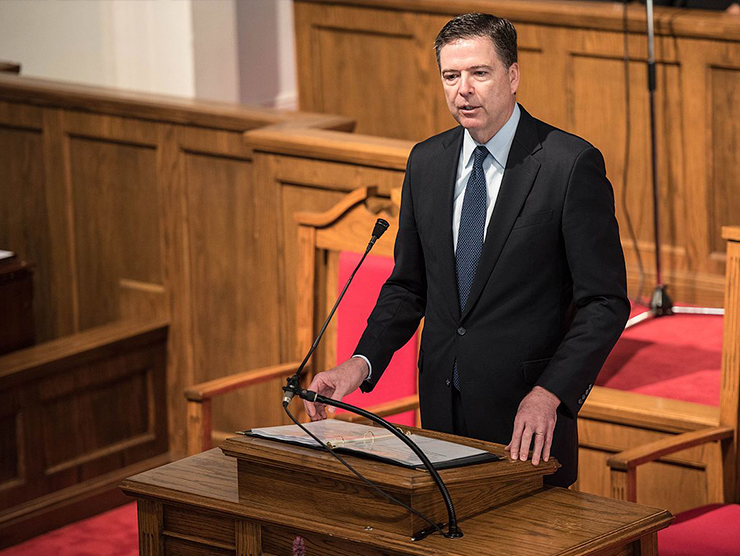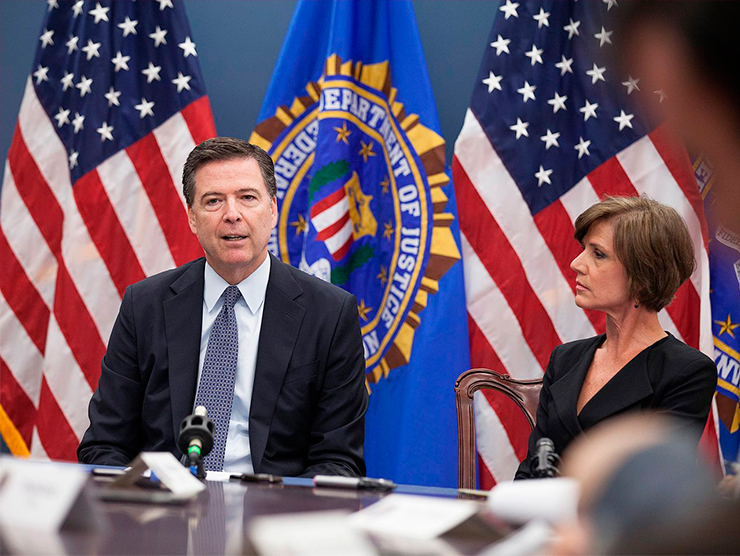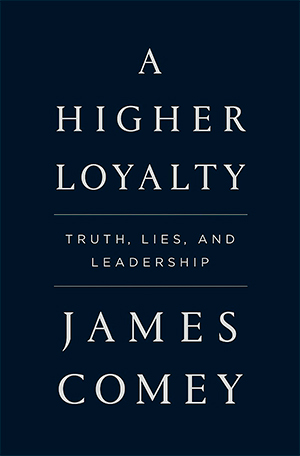
Former FBI Director James Comey.
("A Higher Loyalty: Truth, Lies, And Leadership," by James Comey, New York: Flatiron Books, c2018, 290 pages, $29.99.)
"A Higher Loyalty: Truth, Lies, And Leadership," by James Comey, is not the gossipy, dishy, dirt-digging, tell-all of "Fire and Fury," the Michael Wolff book, released in January, about what went on in the first year of the Trump administration, as told to him by those he spoke with and observed in the White House.
"A Higher Loyalty" is a reasoned, thoughtful, intelligent exploration of one committed professional’s attempt to come to grips with what he feels is unethical leadership at the highest level of our American government. Above all that, however, it is a deeply-felt memoir of someone who’s been at the highest levels of government in Washington for many years, and who, in his book, chooses his words carefully (well, most of the time).
James Brien Comey Jr. served as the seventh director of the Federal Bureau of Investigation from Sept. 4, 2013, until his dismissal on May 9, 2017. He worked under Rudy Giuliani in the U.S. Attorney’s Office of the Southern District of New York (as of this writing, Guiliani has joined President Donald Trump's legal team), investigating the Mafia. He worked in the George W. Bush administration as deputy to George W. Bush’s attorney general John Ashcroft. He was appointed FBI director by Barack Obama, working under both his attorney generals, Eric Holder and Loretta Lynch. In between his gigs in Washington, D.C., he was in private law practice and/or worked for various private companies as legal counsel.
Throughout the book, Comey recalls his presence at important moments in recent history. His sketches of those with whom he interacted over the years are strikingly astute. He wrangled with Vice President Dick Cheney over the torture of prisoners and recalls how the Bush administration tried to get Attorney General Ashcroft to sign an important order concerning the legality of various methods of torture, while Ashcroft was on his sickbed, something Comey prevented by racing to his boss’s side.
He also tells of the time he was in charge of the case against Martha Stewart for insider trading. His judgment that celebrities/the rich and powerful are subject to the same laws as the rest of us ring true. As to the portrait of Cheney, he paints a mean man; about George W. Bush, he says there are two sides of his personality: a funny, joking side and a snide and nasty side that co-exist. He describes Obama’s thoughtfulness and concern for doing the right thing under the law, which, he states, endeared Comey to him. (By the way, Comey was a Republican, as has says most FBI agents are: Right of center.)

Former FBI Director James Comey and former Deputy Attorney General Sally Yates
I surmise "A Higher Loyalty" may not sell as briskly as Wolff’s book since people seem to like reading gossip more than dealing with complicated issues of truth, lies, and leadership. Those who have reviewed "A Higher Loyalty" and discussed it at length in the media, have chosen to concentrate on the last third of the book. These are the chapters that deal with Comey’s interactions with the 2016 presidential campaign and the first year of the Trump administration, and relates those telling conversations with Donald Trump.
In the book, Comey reveals that it came to him "in a flash" that Donald Trump was behaving not as a president, but as a mob boss. Why? Well, Comey knew from mob bosses, underbosses, and made men, and he saw the similarities between Trump and Mafia bosses, the most telling of which was demanding absolute and utter loyalty. It’s pretty ugly, but it's a compelling epiphany.
Receiving the most headlines and news coverage, however, is what occurs in a mere third of the book: Comey's interactions with Trump. He kept memos of these interactions because, he says, what happened when he was one-on-one with Trump stunned him so thoroughly, as it was "outside the norm" of what he knew of relationships between FBI directors and presidents.
On his second encounter, after a private dinner where he says he was conned into accepting, and where Trump demanded his loyalty, he writes that Trump never stopped talking, “building with his words a cocoon of alternative reality”:
I went back to the FBI headquarters and told members of my staff that I had probably ended any personal relationship with the president…. [because] I had resisted his pledge of loyalty two weeks earlier, and now I had just cut through the cocoon to criticize the man behind the desk. We weren’t going to have a friendly rapport, as I did with Presidents Bush and Obama. That was not necessarily a bad thing. FBI Directors shouldn’t be too close to a sitting president or his Administration – which, of course, was the original reason I was at the White House that day.
He goes on:

…the encounter left me shaken. I had never seen anything like it in the Oval Office. As I found myself being thrust into the Trump orbit, I once again was having flashbacks to my earlier career as a prosecutor against the Mob. The silent circle of assent. The boss in complete control. The loyalty oaths. The us-versus-them world view The lying about all things, large and small, in service to some code of loyalty that put the organization above morality and above the truth.
Yes, these are important segments of the book, of that there is absolutely no doubt, but there is so much more in these pages. It is, as I have stated, a memoir, covering Comey's entire life up to now. I believe he is being brutally honest when he admits he made mistakes that will forever haunt him. And, alas, the American people.
Before I began this review, I very carefully read these words from James Comey’s Author’s Note:
Who am I to tell others what ethical leadership is? Anyone claiming to write… about ethical leadership can come across as presumptuous, even sanctimonious… All people have flaws and I have many… I can be stubborn, prideful, overconfident, and driven by ego.
It’s Comey’s full disclosure, and whatever anyone many think of the man, after reading his memoir, I believe him to be honest, upright, and caring. These comments set the tone for what he went on to say in his book. Yes, the man has flaws, among them his determination to do the right thing. It were those flaws, and what I can only describe as a Boy Scout-like, Dudley Do-Right determination to be honest and true and follow the law, which I believe ultimately led to the end of his FBI career.




